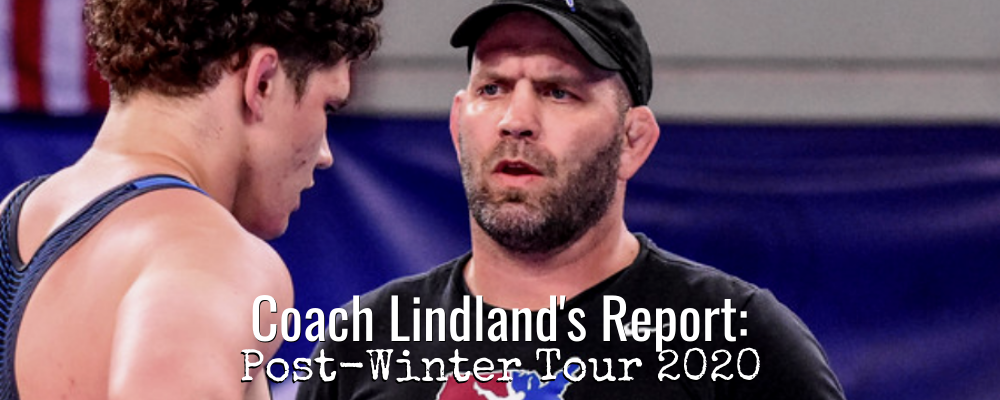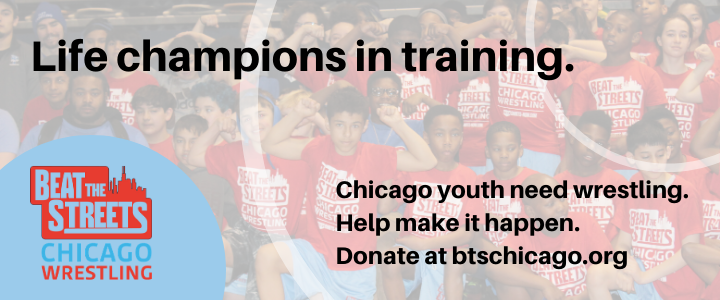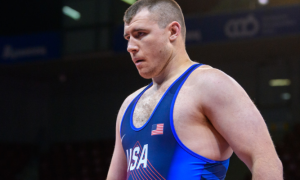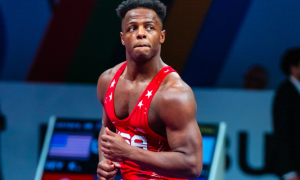Five Point Move is proud to host USA Greco-Roman National Team head coach Matt Lindland each week for Coach Lindland’s Report. Here is where you will find detailed perspectives from Coach Lindland pertaining to recent results, upcoming events, training plans, and other Greco-related news that isn’t available anywhere else. ALSO — if you would like to donate directly to the US Greco-Roman program, just click here. Your support is appreciated!
The European Winter Tour of 2020 for USA Greco-Roman Seniors is now in the firmly in the books. It began midway through January with the Matteo Pellicone Memorial in Rome, continued the following weekend in Denmark at Thor Masters, and then stretched beyond another week and some change with Thor Masters’ sidekick training camp. As a refresher, Max Nowry (55 kg, Army/WCAP, world #3) earned silver in Rome, while G’Angelo Hancock (97 kg, Sunkist, world #13) grabbed bronze. They were the only two US medalists from the tournament — but not the only ones who picked up valuable United World Wrestling “Ranking Series” points, as several walked away with brand-new world rankings.
US National Team head coach Matt Lindland, who traveled to Denmark while Pellicone was underway, provides his assessment of the team’s performance as a whole before we switch gears to Thor Masters, where Brady Koontz (55 kg, TMWC/Ohio RTC) finished second. A couple of individual showings are brought up, but much of the focus from Denmark stays on the camp. Each year, the Thor Masters training camp for the Americans is a source of conversation, and this time around even more so. Lindland very much liked what he saw from the athletes in Denmark camp, particularly due to the timing of the training excursion related to the next Olympic qualification opportunity in March. We close up with a couple of items regarding the upcoming Armed Forces Championships as well as how scrutinized the training plans for US Seniors headed to Ottawa will be in the month ahead.
5PM: What was your general takeaway from the “Ranking Series” tournament? Considering how these events are drawn, and the level of competition available, did it meet your expectations? Did it fall short? Or did you just chalk it up as a sort of litmus test coming out of January Camp?
Coach Matt Lindland: Well, I did not go to Rome, I went with the the guys who went over to Thor Masters. But we had four coaches already going and I was happy to let them work with the athletes and be able to have the opportunity to watch on film. It was going on live, it was daytime, actually, so that was a quite a change. I was able to watch matches in real time instead of, you know, waking up at 3:00am to watch matches when our guys are competing.
The competition was very stout, for sure. I think our guys could have opened up and and taken more risk. To me, it seemed like they were wrestling to protect themselves or to protect something, and there’s really nothing to protect at this moment. It’s all about taking risk and creating opportunities. And the more risks we take, the more opportunities seem to present themselves to us.
When our guys are attacking, we are really good. The results from Rome were not indicative of how good this group of athletes we sent actually are. I expected better results, but I think it was just a symptom of our guys not taking risks and and putting their opponents under threat as much as they could have been. And you know what, when they showed up in Denmark for the two-week training camp, that’s what I saw. It was the opposite. I saw these guys experimenting, taking risks, and making important adjustments to the ways they were wrestling. Just little tweaks and timing things.
Really, the the biggest thing that our guys need to realize is when they’re attacking offensively and not worried about the results — but instead just worried about trying to get that next point at that moment and really just wrestling — they perform so well. There are incredibly talented athletes in our program. So I mean, the tournament, we definitely trained through that tournament in preparation for our most important event that’s coming up the second weekend in March. I feel like we were really using Rome to prepare us for for the qualifying tournament in Ottawa. But I still think we could have done a lot better results-wise if our guys just opened up and competed up to their abilities.
When they got to Denmark, it was as if all of them had something to prove in that camp and it was an incredible opportunity for us to wrestle some of the best guys in the world day-in and day-out. They were making adjustments after every practice, before practice, and setting goals going into our training sessions related to what they wanted to accomplish. Guys would ask questions. I want to score, and that’s great so then it is, Well, how are you going to score and what are you going to do to create those scoring opportunities?
Those candid conversations led to a lot more offensive scoring because they were creating angles of attack and they were putting their opponents under threat. You know, we are an American style where we are either really super-aggressive but we don’t score points; or we’re a little laid back and not wanting to take a risk in fear of making mistakes sometimes. But the reality is, we’re going to make mistakes, and at the end of the day, all you’ve got to do is score more points than your opponent to win. It is always okay to make mistakes. It is okay to to give up some points here and there, but you have got to score more points than the other guy and that requires you to create offense and constantly threaten your opponent with your own scoring opportunities.
I think we should have and definitely could have had better results in Rome had we employed the same attitude that we had during those two weeks in Denmark. So I’m very impressed with the way the guys trained and and took this opportunity very seriously, and I’m excited moving forward to what’s ahead of us and getting these weights qualified. I know that we’re capable of doing it in every single weight class if our guys just go out, attack like they’re capable of, and and score points.
5PM: In the last report, Haparanda was brought up because there were so many US vs. US matchups early on in that tournament. In Rome, there was only one of significance, which Pat Smith and RaVaughn (Perkins). Seeing them paired together in the first round, did that annoy you?
ML: Yeah, absolutely (laughs). You know, I kind of even questioned if we should send #2’s and #3’s, but you know, these guys all deserve that opportunity and I don’t want to take an opportunity away from anybody. But as for a guy like Pat Smith, he is going to look at that as an opportunity to improve, grow, and make some adjustments. Like I said, he did that at the camp, for sure, just constantly figuring out ways to get better. Pat did a great job of using that experience as a growth opportunity to get better to make some really important adjustments heading into the Pan American Qualifier. I also think that stylistically, Pat matches up better than Perkins, Kamal (Bey) or anyone else at that weight class with the opponents he will be competing against in Ottawa.
5PM: In Rome, Tracy (G’Angelo Hancock) continued his impressive streak of medaling in “Ranking Series” tournaments. He only lost to (Felix) Baldauf, and no offense to Baldauf I guess, but he appeared very beatable for Tracy in my eyes. A couple of sequences, a couple of positions, and it’s a 180. They’ve gone together a lot in camps, what do you think the deciding factor was in their bout at Pellicone?
ML: Well, Tracy and I talked about that and we watched that film over in Denmark together. We looked at some specific situations, especially those two attempted arm throws where he (Hancock) countered and did not get points for them. You know, we could watch that again and again, and it is, Did he did he stop the guy on his back long enough? Was it was a slip, or were both of those slips? I’m a little biased because I wanted Tracy to win, but I think we need to do a better job of showing the official that we countered that attack and that we actually scored on that attack.
I don’t think it was a slip, but I do think that sometimes the officials don’t recognize what our athletes are doing because they’re so good and so dynamic. I mean, one guy throws, the other guy steps off the throw, counters and puts a guy on his back and then he rolls to his belly. So it’s like, Was it a slip? Or was that an actual counter?
In my opinion, they were a couple counters in that situation. There was also a step-out that they missed for Tracy, and momentum never shifted in his direction. But yes, of course, Baldauf is very beatable for Tracy. They just trained together for two weeks and now they’re in camp in Oslo training together again, as well. I don’t think that’s a match that we’ll see Tracy lose again.
But — sometimes you need those losses to know where you’re at, and know what you have to do to make some adjustments. Now, in both of those situations where Tracy got off the load and countered those throws, there were opportunities to pin the guy and not just look for points. I mean, I watch guys like Nolan Baker, who’s constantly trying to pin people, and that is the goal and objective of our sport. To put guys on their backs and keep them there.
When we put a guy on his back, we’ve got to not only show that it was our action, we’ve got to try to pin these guys and end the match quickly. That helps you for the next round and in future bouts (at a tournament).
But yeah, I think it was a very winnable match with some adjustments he can make. It was really just another learning opportunity for him, ultimately.
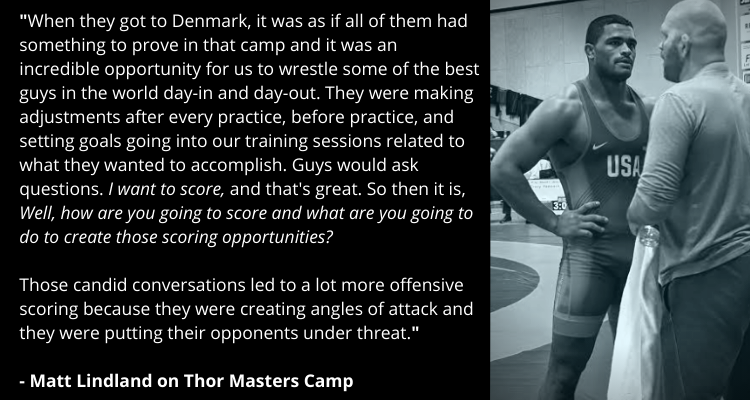
5PM: I am going to make a statement and you can tell me whether or not it’s over the top: Cohlton Schultz probably could have won Thor Masters.
ML: I don’t think that’s over the top at all. I fully expected him to win. I don’t know if you noticed, but he was not in Greco-Roman shape. He got tired in the push. And I understand that he’s not the biggest heavyweight and he’s moving some big men around out there, but in both of his losses he was winning those matches and got tired. Cohlton needs to make some adjustments in his periodization, but that’s probably a little bit of symptomatic of the fact that he lives in Arizona and he’s doing folkstyle part-time and helping their program prepare their heavyweights.
Cohlton should probably be in a full-time Greco-Roman room preparing to win an Olympic medal because he’s capable of breaking through this year. I mean, he’s a threat to anyone in our country at that weight class and he has beaten a lot of these guys at the world level, albeit at Cadets or Juniors. But now he’s beating a lot of these guys on the Senior level, as well. It would not surprise me if Cohlton, (Adam) Coon, or for that case Robby Smith… They are all very close competitors. Jacob Mitchell is also improving a lot and becoming a real threat in that weight class.
But I have a lot of confidence in Cohlton, I just didn’t feel like his his conditioning was up to par even even at this time of year heading into winter tours. And again, I think that’s a little bit symptomatic of the fact that he’s not training full-time Greco right now, even though he is trying to compete with guys in the world who are 100% committed to the art of Greco-Roman wrestling.
5PM: Does Carter Nielsen catch your attention at 87? He’s not at all big for the weight class but he seems to have a very good attack plan out there and he’s forcing the issue with tie-ups that leads to two-point takedowns or similar opportunities.
Coach Matt Lindland: Yeah, Carter is a very aggressive wrestler. I like his approach, he is very aggressive going after guys and trying to score. But, Carter needs to work with his coaches up in Northern Michigan and focus on the fundamentals of our sport. I mean, you are in the same room as Andy Bisek, a guy who positionally was one of the best in the world — at any time. We have talked about Andy in the past, just his stance integrity, his position, and how his stance was very difficult to break. And that is the kind of man Andy is, he’s just hard to break because he has such a solid foundation.
Carter should take advantage of the opportunity to study under Andy Bisek and just develop a better push, better position, and stop giving up underhooks and two-on-one’s so you don’t have to fight out of those. Instead, we want him to force his positions and maintain his stance integrity a little more. He’s very close. He is very aggressive in that he is willing to make attempts and score, it’s just that he leaves himself vulnerable.
I think we’ve talked about this before, but it’s the difference between Senior and U23. We’ll go to the U23 Worlds and be like, Man, there were a lot of exciting matches! But I think that is because guys are just a little less disciplined with regard to their position and stance, and they create openings, which create opportunities for more scoring. The U23 guys are just as good technically as the Seniors, it’s just positionally, they fail sometimes in situations where they give up positions that lead to scoring opportunities. It makes for fun matches and exciting wrestling, but I think we could have a much higher win/loss ratio for Carter if he really honed in on just focusing on his stance and position.
5PM: It’s tradition at this point now with Thor Masters to ask about the training camp. Everyone seems to benefit from it. Considering this is an Olympic Year, were there any differences in the camp at all, or did you yourself see the camp differently since it feels like we’re always watching things with a closer eye these days?
ML: Well, I think that might be partly the case because we are a little more intently focused on what we need to do coming up, and we were certainly focused at this camp. As were the rest of the nations. I think that sense of urgency is kind of infectious, and that everyone in the world has that same sense of urgency.
I will tell you one thing about the camp: the numbers were bigger than ever before. There were more nations. We’ve never seen Poland at the camp. We’ve never seen Turkey or Hungary, and it was great to have some of those top teams involved. When we started this cooperation group, it was with the Nordic and Baltic nations. Now we are getting a lot of the Eastern European nations involved, and it is really to develop depth in our own programs. None of these programs have a lot of depth within their own countries, but when they start training together it creates a lot of depth in the room. Every practice, every go, you’ve got a great partner. Sometimes, you have one World medalist after another in your group to work with.
What I loved about this camp is that I think there was a lot more focus and intensity, but also due to the timing. Everyone is getting ready to qualify. We have guys getting ready to qualify at the Pan Americans, and then there were of course guys in Denmark preparing for the European Championships as well as their own qualifier, which is a little farther away. But still, the timing of the camp was great and it keeps getting better. Like I said, more nations are showing up and getting involved with this group, so it’s a real honor to be part of this cooperation group. I am very thankful to these coaches for organizing these camps and that we’re working together. Plus, it is raising the level of Greco-Roman across the entire world, not just domestically in our own nations. Internationally, the level continues to increase.
It’s almost shocking for me to to see how our sport has grown over the years. Maybe I’m looking at it from a different lens, from the ’90’s and early-2000’s, but the athletes today are just more dynamic and there is just more creativity. I think some of that has to do with video access. We’re able to go to a tournament, then two days later we’re at a camp watching video and reviewing matches to see how we can improve and make adjustments.
I’ll say this — this camp for the American team was one of the best camps I’ve ever been a part of. They were there to put work in and were really focused. There were no extracurricular activities going on, it was all about preparing for the qualifier, which is our next goal, and getting those weights qualified. And they went through a lot of adversity. There were some hard practices, although there was a lot of built-in recovery since the camp was periodized very well.
You’re going to get beat up in this sport. You are going to get sore ribs, and bumps and bruises. A lot of our athletes incurred those same things, whether it was ribs, twisted up ankles and knees… Tracy ripped all of the skin off his knuckles from guys trying to defend his gutwrench, and he had to fight through that the whole camp, just taping up his hand. But they all fought through some type of adversity, and it was really exciting to see from a coach’s perspective.
There is no tournament that I can think of where you will go in at 100% healthy. Something is going to hurt, be it a tweaked ankle, your ribs, or you have a sore neck. It is a violent sport and your body takes a lot of damage. You have to be able to recognize if it’s an injury, or if you’re just hurt, and figure out what the best course of action is. Sometimes, it’s easier to say, This hurts, I should ice this and just rest. Sometimes it is, Yeah, this hurts, but I can train through it and attack with the other side of my body, or it might be like, I just won’t let him get a lock on that spot on my ribs. Every one of our guys battled through adversity during the whole camp and they came out of it prepared and ready for what’s facing us in the near future.
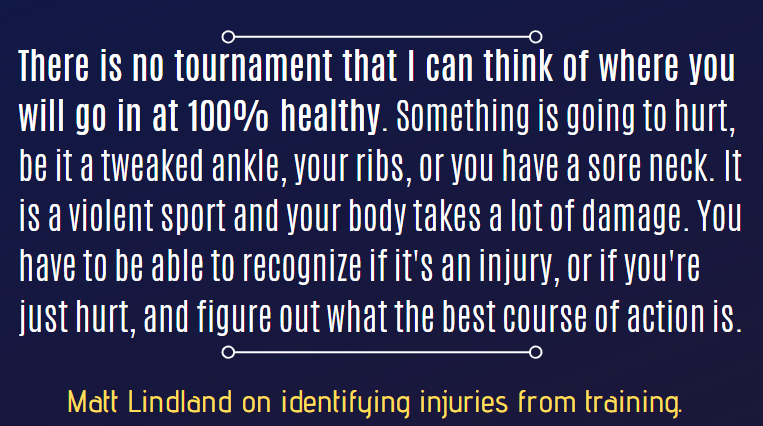
5PM: Armed Forces this year is opening up Trials qualifying spots for eligible parties in all ten weight classes, not just the Olympic six. Do you like that stipulation?
ML: I think that was an oversight in the way we wrote our procedures, but it’s a win for guys on the bubble who might not have gotten into the final Olympic Trials.
I understand based on TV time that we are all about trying to limit the the number of participants to keep that number down, and to keep the guys who should be there, there, and to keep the guys who still got a ways to go, out. This is basically all in hopes of getting more air time for TV, but that’ll probably just translate into more freestyle matches, unfortunately (laughs). But no, it’s all in hopes for our wrestlers to get better exposure. I agree with that philosophy, but with this (Armed Forces), I really just think that it was probably an oversight in the way we wrote those procedures because that certainly wasn’t the intent. Maybe I didn’t realize it because in my brain we’re thinking six weight classes. But you know what? It’s great. The Armed Forces is a very important event to each one of those service branches. It’s an important event for them, so I think it’s great there is some added significance.
I agree with that philosophy, but I really I really think that. It was probably an oversight in the in the way we wrote those procedures because that was certainly not the intent. And and maybe I didn’t I didn’t realize it because in my brain we were thinking six-way classes and so but you know what it is it’s great armed forces are very important event for each one of those. But it only goes to the top-2, so if #1 and #1 are already qualified, there is not going to be a third-best guy (who qualifies). We got that part of it right.
One of the things that it might do is it might allow one of these one of these guys from the Air Force or Navy who breaks through and gets that qualifying spot might to increase opportunities for their programs. If they get a guy qualified to the Olympic Trials, maybe we’ll see the Air Force and Navy programs invest a little more time and resources into having Greco-Roman again. Back in the day, Navy and Air Force had really strong programs and now they’re both struggling a bit compared to what the Marine and Army programs are doing. Because, it is important to the Marines, it is important to Army, and I wish it was just as important to the Navy and Air Force to have these programs. And maybe, if they get someone qualified, it will help them become a little more inspired.
5PM: Do we know yet who exactly is going to the Pan Am Championships? Is it the 2019 World Team or is there some mixing and matching?
ML: Right now, it is the 2019 World Team with the exception of Ildar Hafizov, who is going to forego the Championships simply because the seeding points aren’t going to matter with guys like (Andres) Montano (Arroyo) getting their points at 63 kilos. He is going to get drawn in anyways, and Ildar feels like his performance will be better if he’s not wrestling the week before. And if he feels like he’s going to compete better, I’m all for it. I am all for these guys doing what they feel is going to help them get the best performance at the Olympic qualifier.
So, as of right now, it is going to be (Mike) Fuenffinger at 60. Army is not going to send 63 kilos (Ryan Mango), so that spot will go to Xavier Johnson. At 72, (Ray) Bunker will compete, and 82 will be (John) Stefanowicz. We just want to have six athletes weigh in, because if we weigh in six, we have the opportunity to wrestle six guys at the Olympic Games, provided we are getting those weights qualified.
And like I said, I feel really good about it, especially after having that camp in Denmark and knowing that I’m going to have these guys back here at camp at the end of this month before going into the (Pan Am) Championships. We are going to travel together from Colorado Springs with the exception of Adam Coon, who is going to be getting married the weekend before the Championships. He’ll head home after he gets married and meet us in Canada.
5PM: How scrutinized are individual training plans going to be from here on out for those tasked with qualifying in Ottawa?
Coach Matt Lindland: I think quite a bit because we’re going to hold our camp before we leave. The mornings will be our hard sessions of getting some scrapping and just priming these guys, getting them ready to compete. They will be pretty short practices with high-intensity, and the afternoons are going to be all about individual time one-on-one with with the training partner, personal coaches, and the National staff.
Right now, everyone should be back working with with their coaches and their personal coaches in their home training environments making adjustments on what they need to do, and scouting film. Once we get to camp it’s all about getting these guys feeling 100% going to this competition, with lots of rest and recovery and individual time for all of our athletes who are asked with getting the weights qualified.
Listen to “5PM33: The Marine Corps’ Jamel Johnson” on Spreaker.
SUBSCRIBE TO THE FIVE POINT MOVE PODCAST
iTunes | Stitcher | Spreaker | Google Play Music | RSS

Notice: Trying to get property 'term_id' of non-object in /home/fivepointwp/webapps/fivepointwp/wp-content/themes/flex-mag/functions.php on line 999

